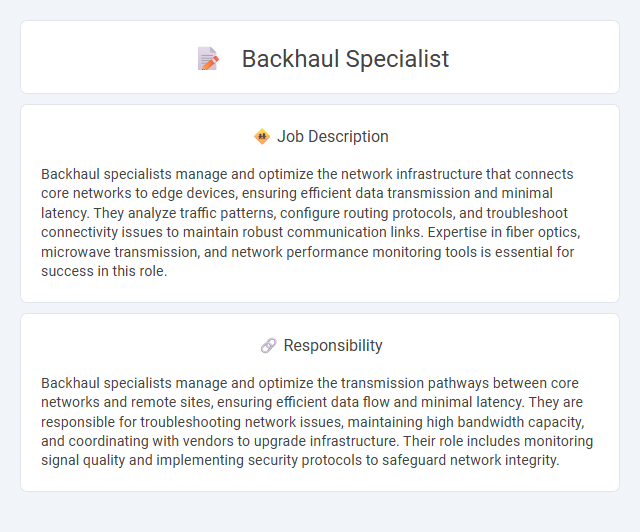
Backhaul specialists manage and optimize the network infrastructure that connects core networks to edge devices, ensuring efficient data transmission and minimal latency. They analyze traffic patterns, configure routing protocols, and troubleshoot connectivity issues to maintain robust communication links. Expertise in fiber optics, microwave transmission, and network performance monitoring tools is essential for success in this role.
Candidates with strong problem-solving skills and technical aptitude are likely to excel as Backhaul specialists, as the role often requires troubleshooting network issues and ensuring stable data transmission. Individuals comfortable working in high-pressure environments and managing complex infrastructure may find this job suitable due to its critical impact on communication systems. Those who prefer routine tasks or limited technical challenges might find the demands of a Backhaul specialist less aligned with their strengths.
Qualification
Backhaul specialists require expertise in telecommunications networks, including hands-on experience with fiber optics, microwave systems, and wireless backhaul configurations. Proficiency in network design, troubleshooting techniques, and knowledge of protocols such as MPLS and OSPF are essential for optimizing data transport efficiency. Certifications like Cisco CCNA/CCNP and familiarity with 4G/5G technologies enhance a candidate's qualifications for managing and maintaining robust backhaul infrastructure.
Responsibility
Backhaul specialists manage and optimize the transmission pathways between core networks and remote sites, ensuring efficient data flow and minimal latency. They are responsible for troubleshooting network issues, maintaining high bandwidth capacity, and coordinating with vendors to upgrade infrastructure. Their role includes monitoring signal quality and implementing security protocols to safeguard network integrity.
Benefit
A backhaul specialist role likely offers significant benefits including competitive salaries and opportunities for technical skill development in networking and telecommunications. Employees may experience job stability given the critical nature of managing data transmission between network sites. They could also gain exposure to cutting-edge technology, enhancing career growth and advancement prospects.
Challenge
Backhaul specialist roles likely involve complex challenges related to optimizing network performance and ensuring reliable data transmission over long distances. They probably face difficulties in troubleshooting network bottlenecks and coordinating between different network segments to maintain seamless connectivity. Handling rapid technological changes and integrating new infrastructure could also present ongoing challenges in this position.
Career Advancement
Backhaul specialists manage the efficient transmission of data between network nodes, ensuring high-performance connectivity in telecommunications infrastructure. Advancing in this career often involves gaining expertise in fiber optics, microwave technologies, and network optimization tools, with opportunities to transition into network engineering or wireless transmission management roles. Certifications such as Certified Wireless Network Professional (CWNP) or Cisco Certified Network Professional (CCNP) enhance prospects for leadership positions and specialized technical roles within the industry.
 kuljobs.com
kuljobs.com